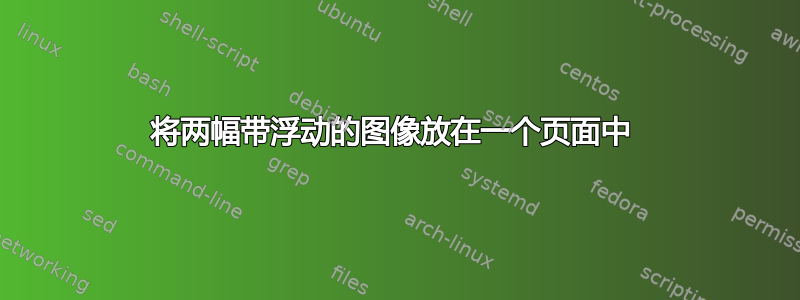
我正在用 Latex 写 B5 格式的论文。在正文中,我可以很好地处理图形的浮动。但在支持信息部分,我有大量图像(仅在不同部分/小节下的图像),我想在一页上放置 2 张图片。但编译后,我在一页上只得到一张图片,这大大增加了总页数。
我必须[H]从float包中使用,因为否则图像会出现在随机位置,并且不会在部分/小节名称下放置任何内容。
我也尝试过类似
\documentclass[10pt,fleqn]{phdthesis}%,makeidx
\makeatletter
\renewenvironment{thebibliography}[1]
{
\list{\@biblabel{\@arabic\c@enumiv}}%
{\settowidth\labelwidth{\@biblabel{#1}}%
\leftmargin\labelwidth
\advance\leftmargin\labelsep
\@openbib@code
\usecounter{enumiv}%
\let\p@enumiv\@empty
\renewcommand\theenumiv{\@arabic\c@enumiv}}%
\sloppy
\clubpenalty4000
\@clubpenalty \clubpenalty
\widowpenalty4000%
\sfcode`\.\@m}
{\def\@noitemerr
{\@latex@warning{Empty `thebibliography' environment}}%
\endlist}
\makeatother
%%% For an A4 format, use there options instead
%\documentclass[12pt,makeidx]{phdthesis}
%\usepackage{a4wide}
\newcommand{\mypm}{\mathbin{\smash{%
\raisebox{0.35ex}{%
$\underset{\raisebox{0.5ex}{$\smash -$}}{\smash+}$%
}%
}%
}%
}
%%% Fonts, uncomment only one option %%%
%\usepackage{utopia}
%\usepackage{charter}
%\usepackage{palatino}
%\usepackage{newcent}
%\usepackage{avant}
\usepackage{pifont}
%\usepackage{mathpple}
%\usepackage{mathptmx}
\usepackage{multicol}
\usepackage{flafter}
%%% If you want to use MakeIndex to create automatically
% an index, uncomment these lines
\usepackage{makeidx} % only with Latex2e
\makeindex
% Other packages
%\usepackage{fancyheadings}
% \usepackage{subfig}
%\usepackage[abbr]{harvard}
\usepackage{fancyhdr}
\usepackage{amsmath,dsfont}
\usepackage{amssymb,mathabx}
\usepackage{epsfig}
\usepackage[figbotcap]{subfigure}
\usepackage{graphics}
\usepackage{float}
\usepackage{here}
\usepackage[super,numbers,sort&compress]{natbib} %coma
\renewcommand\bibsection{\section{\refname}}
\usepackage{rotating}
\usepackage{multirow}
\usepackage{comment}
\usepackage{captionhack}
\usepackage{epigraph}
\usepackage{array,multirow,nicefrac}
\usepackage{appendix}
\usepackage{acronym}
\usepackage[chapter]{algorithm}
\usepackage{algorithmic}
\usepackage{mathtools}
\usepackage{adjustbox}
\usepackage{booktabs}
\usepackage{tabularx}
\usepackage{csquotes}
\usepackage{notes2bib}
\usepackage{siunitx}
\usepackage{hyperref}
\usepackage{amsmath}
\usepackage{mciteplus}
\usepackage{longtable}
%----------------------------------------------------------------------------------------------------------
\makeatletter
\newcommand*\mycommand[1]{\texttt{\emph{#1}}}
\renewcommand{\thefootnote}{\fnsymbol{footnote}}
\renewcommand{\mcitesubrefform}{\textsuperscript{\arabic{mcitebibitemcount}\alph{mcitesubitemcount}}}
\makeatother
%----------------------------------------------------------------------------------------------------------
% \usepackage{showframe}
\usepackage{lscape}
\usepackage[table]{xcolor}
\usepackage{wrapfig}
\usepackage{pstricks,pst-node}
% \usepackage{pstricks-add}%pst-char,,pst-text,ae,pst-grad,pst-slpe
\usepackage{fancybox}
%\usepackage[dvips,margin=1cm]{geometry}
% \usepackage{lmodern,pst-node}
\usepackage{psfrag}
% \renewcommand{\thesubfigure}{}
\usepackage{float,afterpage,dblfloatfix}%stfloats
% dblfloatfix fixes two floatpages after each other
% Alter some LaTeX defaults for better treatment of figures:
% See p.105 of "TeX Unbound" for suggested values.
% See pp. 199-200 of Lamport's "LaTeX" book for details.
% General parameters, for ALL pages:
\renewcommand{\topfraction}{0.9} % max fraction of floats at top
\renewcommand{\bottomfraction}{0.8} % max fraction of floats at bottom
% Parameters for TEXT pages (not float pages):
\setcounter{topnumber}{2}
\setcounter{bottomnumber}{2}
\setcounter{totalnumber}{4} % 2 may work better was 4
\setcounter{dbltopnumber}{2} % for 2-column pages
\renewcommand{\dbltopfraction}{0.9} % fit big float above 2-col. text
\renewcommand{\textfraction}{0.07} % allow minimal text w. figs
% Parameters for FLOAT pages (not text pages):
\renewcommand{\floatpagefraction}{0.7} % require fuller float pages was 0.7
% N.B.: floatpagefraction MUST be less than topfraction !!
\renewcommand{\dblfloatpagefraction}{0.7} % require fuller float pages 0.7
\makeatletter
\def\zaptype#1{%
\listsubcaptions % Finish the last set of sub-floats before
\def\@captype{#1}}% switching to another float type.
\makeatother
%%% Path to the directorz containing the graphics and figures
\graphicspath{{./pics/},{./pics/chapter_2/},{./pics/chapter_3/},{./pics/chapter_4/},{./pics/chapter_5/},{./pics/chapter_6/}
,{./pics/chapter_7/},{./pics/chapter_8/},{./pics/chapter_9/}}
\usepackage{ifpdf}
\ifpdf
\graphicspath{{./png/}}
\DeclareGraphicsExtensions{.png}
\else
\DeclareGraphicsExtensions{{.eps},{.epsi}}%,{.ps}
\fi
%%% General page formatting
\renewcommand{\textfraction}{0.01}
\renewcommand{\topfraction}{0.99}
\renewcommand{\floatpagefraction}{0.99}
\renewcommand{\bottomfraction}{0.99}
\newenvironment{Abstract}
{\begin{center}\textbf{Abstract}%
\end{center} \small \it \begin{quote}}
{\end{quote}}
% Macro for 'List of Symbols', 'List of Notations' etc...
\def\listofsymbols{\input{symbols} \clearpage}
\def\addsymbol #1: #2#3{$#1$ \> \parbox{4.6in}{#2 \dotfill \pageref{#3}}\\}
\def\newnot#1{\label{#1}}
\pdfcompresslevel=3
\typeout{Dissertation}
\usepackage{hyperref}
%\usepackage{multibib}%[resetlabels]
% \def\@mb@citenamelist{cite,citep,citet,citealp,citealt,footcite,nocite}
% Initialize each paper type for which you need a bibliography.
% Just a dummy parameter is necessary.
% \newcites{p}{Publications}
%\newcites{journal,conf,techreport,submitpaper}{Journal Papers,Conference Papers,Technical Reports, Submitted Papers}%Journal Papers
\DeclareSIUnit\molar{\mole\per\cubic\deci\metre}
\DeclareSIUnit\Molar{\textsc{m}}
%%% To compile only one or some chapters, use the following
% command
% \includeonly{chapter1,chapter2,chapter3,chapter4,appendix_A}
%\includeonly{thesis_acknowledgements,chapter2,chapter3}
%\includeonly{chapter2}
% Morerow Comments
% \newcommand{\comment}[1]{{}}
% correct bad hyphenation here
% TODO hyphenation
%\usepackage{hyphenat}
%\hyphenation{qua-dra-tic SRBCT pre-ser-va-tion Min-kow-ski a-dapt-ive de-ri-va-tive pat-ches pre-serv-ing re-sul-ting Em-bedd-ing
%where-by uni-form de-ri-va-ti-ves con-ti-nu-ous-ly wille-keurige voor-ge-steld}
% solve hyphenation that contain a dash like electromagnetic-endioscopy: electromagnetic\hyp{}endioscopy
% high\hyp{}dimensional
% \usepackage{scrwfile}
% \usepackage{xy}%etex
% \xyoption{all}
%%% Begining of the document
\begin{document}
\subsection{Section Name}
\begin{figure}[H]
\includegraphics[width=\linewidth]{images1.png}
\caption{caption 1}
\label{fig1}
\includegraphics[width=\linewidth]{images2.png}
\caption{caption 2}
\label{fig2}
\end{figure}
\begin{figure}[H]
\includegraphics[width=\linewidth]{images3.png}
\caption{caption 3}
\label{fig3}
\includegraphics[width=\linewidth]{images4.png}
\caption{caption 4}
\label{fig4}
\end{figure}
\end{document}
代替
\subsection{Section Name}
\begin{figure}[H]
\includegraphics[width=\linewidth]{images1.png}
\caption{caption 1}
\label{fig1}
\end{figure}
\begin{figure}[H]
\includegraphics[width=\linewidth]{images2.png}
\caption{caption 2}
\label{fig2}
\end{figure}
\begin{figure}[H]
\includegraphics[width=\linewidth]{images3.png}
\caption{caption 3}
\label{fig3}
\end{figure}
\begin{figure}[H]
\includegraphics[width=\linewidth]{images4.png}
\caption{caption 4}
\label{fig4}
\end{figure}
但如果我需要在之后添加一些内容(如果我在中间添加一个图形,我必须重新做所有事情),那么它就没什么用了。而且,如果我在一个文件中包含两张图片\begin{figure},那么在它之前我会得到一个空白页。
答案1
在一页中放置两幅图像[H]是最糟糕的选择,因为这会避免将两幅图像浮动到接近右点(很可能是下一页的开头)而不会留下巨大的浪费空间。
你实际上只需要照顾好树木就可以避免这种情况:
(1)显然,始终避免 [H](至少对于这个目标而言)。
(2)放置[p]选项t单独(或与和结合b)在需要(方便、允许)对浮点数进行分组时使用。
(3)注意两张图片的高度加上两个标题的高度还有一些(因为\floatsep如果\textfloatsep还有一些文本)不超过文本的总高度。如果是这样,请减小图像尺寸、标题或两者。
或者,您可以将多张图片放在一个浮动框中,但这并不能免除 (3) 的问题,只会使选项变得[tbp]无关紧要(只要浮动框的高度接近整个文本区域的高度)。这种方法的唯一优点是强制合并图片(即使它们根本不适合页面),但正是出于这个原因,通常最好使用两个浮动框并使用适当的选项:
本文尝试通过一些例子来解释这一点:
\documentclass{article}
\usepackage{geometry,lipsum,graphicx}
% Just to simplify the posterior code
\def\image#1{\centering\includegraphics
[width=\linewidth,height=.34\textheight,keepaspectratio]{#1}}
\def\wideimage#1{\centering\includegraphics
[width=\linewidth,height=\textheight,keepaspectratio]{#1}}
\def\captionlipsum{\caption{\protect\lipsum[2]}}
\begin{document}
\lipsum[1] % dummy text
% [p] option is good if you want two images in one page
\begin{figure}[p]\image{example-image}\captionlipsum\end{figure}
% option here is superfluous (except if you use also "b" or "t")
\begin{figure}[tbp]\image{example-image-a}\captionlipsum\end{figure}
% [p] option still works!
\begin{figure}[tbp]\image{example-image-1x1}\captionlipsum\end{figure}\lipsum[4]
\begin{figure}[tbp]\wideimage{example-image-16x9}\caption{ssss}\end{figure}\lipsum[5]
\lipsum[3]
% options here agian is superfluous
\begin{figure}\wideimage{example-image-9x16}\captionlipsum\end{figure}\lipsum[5]
% Images too big per only one page
% Use [t], [b] or [tp] but not [p] if you want avoid a centered image without text around
% (maybe not a bad idea after all ...)
\begin{figure}[tb!] \wideimage{example-image-16x9}\captionlipsum\end{figure}\lipsum[5]
\begin{figure}[tb!]\wideimage{example-image}\captionlipsum\end{figure}
\lipsum[3]
% Two images in a float to maintain together. Not a good idea in this case ....
\begin{figure}
\wideimage{example-image-a}\captionlipsum\vspace{\floatsep}
\wideimage{example-image-b}\captionlipsum\end{figure}
\lipsum[5]
% ... unless you take care of the image size
\begin{figure}
\image{example-image-a}\captionlipsum\vspace{\floatsep}
\image{example-image-b}\captionlipsum\end{figure}
\lipsum[6-20]
\end{document}





